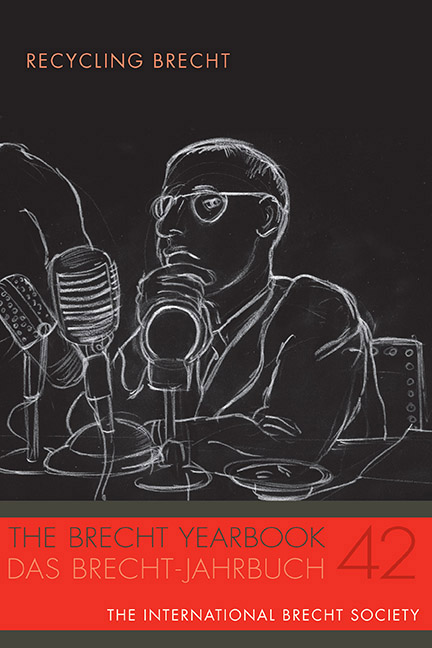Inherent Estrangement: Brecht’s Reading of Shakespeare’s Tragedies
Published online by Cambridge University Press: 09 April 2021
Summary
Some see Shakespeare's tragedies as an aesthetic response to bad politics. This might have been part of what attracted Brecht to Shakespeare and to tragedy. Brecht turned to Shakespeare on and off during his career, as numerous and mostly short notes attest. But there were times when Brecht's studies of Shakespeare intensified, and these were times when Brecht struggled with how his own theater could respond to extreme changes in German politics. Shakespeare's approach to theater disrupts the tragic representation of historical narratives. Brecht detected elements of Verfremdung in this aspect of Shakespeare's tragedies and sought to recycle these components in his most experimental theater and in his own staging of Greek tragedy.
To illustrate this I will concentrate on two examples of Brecht's reception of Shakespeare: his notes on Macbeth in 1927 and his reading of Hamlet in 1948. In 1927 Brecht was writing the second phase of his Fatzer fragment, a play about four World War I soldiers who, under the guidance of Johann Fatzer, desert from the German army and attempt to live collectively in hiding while waiting for a revolution that they expect to end the war. In 1948 Brecht turned to Hamlet when he was directing his Antigone des Sophokles, to which he added a new prelude about two sisters who find out that their only brother has deserted from the German army and is about to be hanged by the SS. During the Weimar Republic, while working on Fatzer and again after World War II, while working on Antigone, Brecht turned to Shakespeare's tragedies to work through the political situations he found himself in. He studied and used tragedy to engage with contemporary history in ways that allowed him to hold onto the critical distance of epic theater, but still engage with violent aspects of history.
It was less Brecht, however, than Heiner Müller who turned to Shakespeare's tragedies in order to come to terms with irrational implications of historical events. Müller turned to Shakespeare in order to counter what he calls “Vereinfachung in Brecht” (simplification in Brecht). Like Brecht, Müller worked with Macbeth and with Hamlet. He also created a stage version out of Brecht's Fatzer fragment, and he wrote his own version of Macbeth.
- Type
- Chapter
- Information
- The Brecht Yearbook / Das Brecht-Jahrbuch 42Recycling Brecht, pp. 21 - 34Publisher: Boydell & BrewerPrint publication year: 2018



